
The calories in a bowl of miso ramen is around 550 to 650 calories.
They say ramen is not healthy.
But for most ramen dishes - you know, even though they are delicious, addictive, and convenient - they can still be healthy.
Do you want to know the health benefits of miso ramen and the calorie count of each miso ramen ingredient?
Keep reading and you will find out...
1. What is miso ramen?
2. What about the calories of each miso ramen ingredient?
3. There are also many health benefits of eating miso ramen...
4. Tips for Healthier Miso Ramen
5. Do you want to know what other nutritions are in miso ramen?
6. Calories of miso-flavored Instant noodles
7. History of miso ramen
8. Regional Miso Ramen Types
1. What is miso ramen?
Miso ramen looks like...

i. Miso, created from fermented soy beans, is the most important aspect of this soup.
Chefs use chicken or pork as the base of this broth.
The richness of miso keeps the broth hot, and it warms the body up.

And you feel instant bliss while eating a piping hot bowl of miso ramen in the harsh cold winter…

ii. Miso ramen goes well with yellow, wavy, medium-thick and high water addition noodles.
Noodles for miso ramen are soft, springy, and smooth and have a nice chewy texture.
They are made of flour, kansui, and water.
iii. Toppings of miso ramen are...
Chashu, menma, fried vegetables (ex. bean sprout, cabbage), corn bits, and butter. (If pork and vegetable are fried together, there is no chashu)

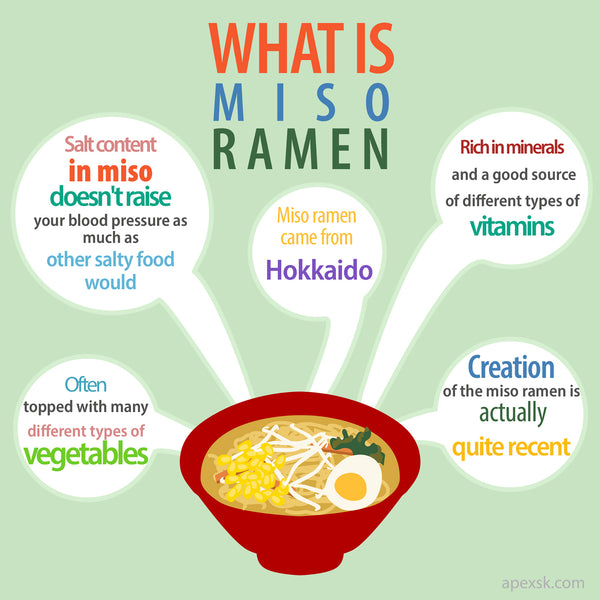
2. What about the calories of each miso ramen ingredient?
The calories of miso ramen depends on the toppings you choose.
Here are the common toppings that go with miso ramen and the calories of each.
Take a look…
i. Ramen noodles: 230g 343kcal
ii. Broth: 300g 9kcal
iii. Miso: 25g 47kcal

iv. Sugar: 10g 38kcal

v. Salt: 1.5g 0kcal

vi. Soy sauce: 2g 1kcal

vii. Lard: 3g 28kcal
viii. Oil: 10g 92kcal
ix. Pork thigh: 30g 55kcal

x. Bean sprouts: 100g 14kcal
xi. Cabbage: 45g 10kcal
xii. Carrot: 15g 6kcal
xiii. Green onions: 10g 3kcal
Other ingredient options are…
i. Chicken broth: 300g 21kcal
ii. butter: 15g 112kcal
iii. Pork belly: 30g 116kcal

iv. Boiled egg: 25g 38kcal
v. corn: 30g 25kcal
vi. sesame: 2g 12kcal
vii. chili oil: 1g 9kcal

viii. garlic: 2g 3kcal
3. There are also many health benefits of eating miso ramen...
i. Miso is a fermented food, so it improves intestinal health and helps your immune system.
ii. The salt content in miso doesn't raise your blood pressure as much as other salty food would.
iii. Miso ramen is often topped with many different types of vegetables. You can take in a lot of vegetables compared to other kinds of ramen.

4. Tips for Healthier Miso Ramen
i. Sample the broth, but don’t drink all of it.
The rich broth is very high in sodium content.
Resist the temptation — leave the soup behind.
When you drink a lot of ramen soup, you should get rid of the salt in your body to prevent high blood pressure.
You should drink a lot of...
Water, coffee, tea, and tea.
ii. Add a lot of vegetables to your toppings.
Vegetables are a great source of fibre and have very little amount of calories.
Here are some of my favourite vegetarian ramen toppings: bean sprouts, green onions, seaweed, and mushroom.

iii. Don’t use too much lard.
Miso ramen has about 10 grams of fat.
There is about 1 to 2 grams of fat from chashu too.
In total, there are about 11 to 12 grams of fat in one bowl of ramen.
Considering that the suggested fat per meal is about 14 to 25 grams.
It is not too much.
But if you don’t want to take in too much fat, do not use lard or use less.

5. Do you want to know what other nutritions are in miso ramen?
Here they are...
Carbohydrate 80.2gProtein 28.8g
Fat 11.6g
Fiber 6.8g
Sodium 2700mg
Potassium 890 mg
Calcium 130mg
Magnesium 85mg
Vitamin B1 0.91mg
Vitamin B2 0.30 mg
Vitamin B6 0.42mg
Vitamin B12 0.1 μg
Niacin 7.8mg
Folic acid 100 μg
Pantothenic acid 2.14mg
Biotin 8.4 μg
Vitamin D 0 μg
Vitamin C 25mg
Vitamin E 0.7mg
Carotene 1200 μg
Omega 3 0.29g
Omega 6 2.47g
Salt 7.0g
Cholesterol 31 mg
How Many Calories are in My Ramen? Calories of 4 Ramen Types
6. Calories of miso-flavored Instant noodles
Knowing health benefits of miso ramen,
You might be thinking of making miso ramen at home.
However:
There is a lot of work involved in making ramen noodles from scratch.
Using instant noodles might be an option for you.
Here are my recommendations of instant noodles miso flavor...
i. Maruchan - Seimen Japanese Instant Ramen Noodles Miso Taste 18.5oz
335kcal
MY THOUGHTS OVERALL ★★★★★
"Oh, this is not what I wanted."
And it does not satisfy your craving. Right?
It will not happen with Maruchan's Seimen miso flavor!
These noodles are authentic and delicious!
If you haven’t tried these yet, you need to try them. It might be one of the best Japanese ramen you have ever had!
I have done some review of these instant noodles.
ii. Nissin - Raoh Japanese Instant Ramen Noodles Miso 17.1oz
335kcal
MY THOUGHTS OVERALL ★★★★★
This is the high-end stuff that tastes as good as the fresh ramen that you can get at ramen shops. Your taste buds will tell you this is real ramen.
It is definitely worth the money and totally different from the cheap 50-cent ramen from the supermarket.
They are excellent base for a complete family meal if you add some vegetables and proteins. It has been my Sunday lunch staple for my family and I. Your family will love it too!
iii. Sapporo Ichiban Miso Ramen
460kcal
MY THOUGHTS OVERALL ★★★★☆
It is an affordable option, that does not skimp out on quality.
Do you want to try a new flavor?
If you are looking for break from the beef, pork, chicken or oriental flavor noodles, but you don't want to raise your budget, these noodles are the perfect choice for you.
It has a very long shelf life, so it makes storing these noodle packages much easier.
I have done some review of these instant noodles.
vi. Maruchan Bowl Taste of Asia Spicy Miso, 3.38 Oz
440kcal
v. Nissin Ramen Noodle, Miso Tonkotsu Pork Instant Noodles With Soup Base (Miso Tonkotsu)
420kcal
7. History of miso ramen
Creation of the miso ramen is actually quite recent.
In 1955, miso ramen was created by Morito Omori, who was an owner of a restaurant in Sapporo, Hokkaido called Ajino Sanpei.
Omori-san read a magazine called Reader's Digest.
In the article the president of a Swiss food company said:
"Miso is really useful. Japanese people should use miso more often in their cuisines”
Omori-san was impressed at how miso, a Japanese traditional seasoning, was perceived so favourably overseas.
And started thinking up recipes which he could incorporate miso.
He obtained different types of miso all around Japan, tested recipes, and asked his customers for their opinions.

8. Regional Miso Ramen Types
SAPPORO RAMEN


Sapporo ramen is characterized by wavy and thick noodles paired with a thick broth and a little bit of ginger and garlic flavor.
The soup is made of pork bone. Topping are green onion, bean sprout, menma, and chashu or ground pork.
Don’t know what some of these toppings are?
Check out our list of 30+ common Japanese ramen topping ingredients!
A specialty of Sapporo ramen is that a lot of restaurants allow customers to customize their ramen toppings, for example, corn, butter, crab, and scallops.
Soup: Pork bone
Noodles: Wavy and thick noodles(cutter number: 22), high water addition rate: 34 to 40%
Toppings: green onion, bean sprout, menma, and chashu or ground pork
JIGOKU RAMEN (KITAHIROSHIMA)

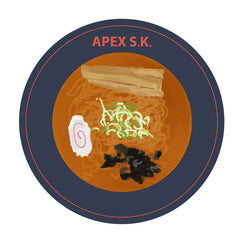
Jigoku ramen is a spicy ramen. Karamiso (hot pepper miso) is used in making the ramen.
There is a hot pepper miso container on the table, so customers can adjust the spiciness to their liking.
At some restaurants, hot pepper is also used in the production of the noodles.
Soup: Spicy miso and pork bone
Noodles: Middle thick, wavy, low water addition rate
Toppings: Chashu, green onions, naruto, bean sprout
SENDAI RAMEN (SENDAI MIYAGI)
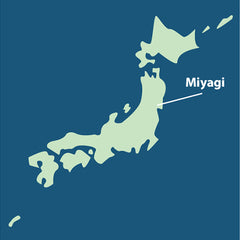

Miso is a specialty of Sendai since the period of Masamune Date, the famous clan leader and founder of modern-day Sendai.
Pork bone and chicken bone broth is used to make this ramen.
You taste the creamy miso broth on its own first and then you can melt Karamiso (served on a spoon) and adjust the spiciness.
Soup: Miso, pork bone, and chicken bone
Noodles: Thick and wavy
Toppings: Chashu, green onions, and menma
AKAYU RAMEN (NANYO, YAMAGATA)


The Akayu ramen is created at a restaurant called Ryushanghai.
When it first opened, the restaurant was not popular, so the owner brought the leftover soup back home and made miso soup out of it.
One day, the store owner’s son put the noodles into his miso soup and said, "Dad, it is yummy!" and the owner started creating this recipe.
Karamiso is also used when eating this ramen. Since it is spicy, you shouldn't mix all the karamiso at once.
Soup: Dried sardine, pork bone, chicken bone, onions, and garlic
Noodles: Thick, wavy and high water addition
Toppings: Chashu, naruto, menma, karamiso(spicy miso)
NIGATA NOUKO MISO RAMEN (NIGATA)


This region’s miso ramen specialty features very thick noodles in a thick, rich soup.
Pork bone broth and red miso makes this soup so creamy and rich.
Customers can adjust the thickness of their soup by thinning it out with a bowl of broth (which is served up separately).
There are a lot of vegetables and ground pork as toppings to these noodles.
The noodles are also very thick (almost like udon), so customers can be really full after eating it.
Soup: Thick and rich pork bone broth and red miso
Noodles: Very thick
Toppings: Vegetables and ground pork

If ramen or any other types of Japanese style noodles and soup is comfort food for you, you might be thinking that you need ramen bowls.
Ramen bowls are perfect for a large bowl of ramen.
They are big enough to pile on the fixings, they are durable, and best of all, they look beautiful.
Share a bowl of warm, hearty home cooked ramen with your family, friends and loved ones for your ramen night.
Or when you order take out, transfer the noodles from those awful looking containers.
You and your family will be so excited and can’t wait until your next ramen night to use these bowls!
About the Author

"I am from Ibaraki, Japan.
Ramen is great! It can bring you a sense of happiness and satisfaction that no other food can. I have been eating ramen for 30 years.
If there is no ramen, my life would be miserable.
Ten years ago, I worked as an office worker. The job was really stressful - excessive working hours, low wages, unpaid overtime work, and constantly being yelled at by my boss.
I was new and alone, no girlfriend, no friends, and felt very lonely.
My only oasis was the ramen shop near the office. For me, the ramen chef there was literally an angel. I saw a halo on his head. (No joke)
Tonkotsu shoyu ramen was my all-time favorite. He made ramen with broth chock-full of umami flavor, nice chewy handmade noodles, and tender chashu.
My greatest dream is connect people with ramen through my blog. I want to share a lot of interesting and funny stories and ramen trivia with you.
Knowing more about ramen can help you appreciate your ramen and make it taste extra delicious."















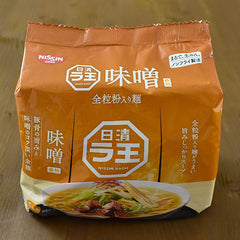





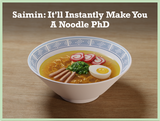
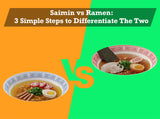
Leave a comment